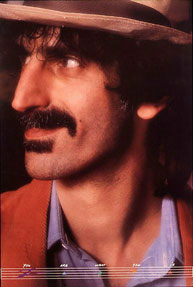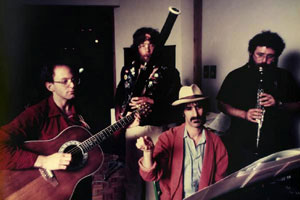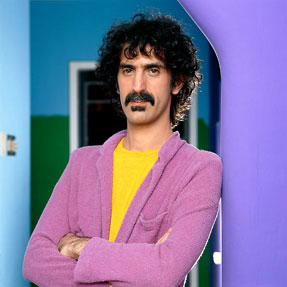07/08/80 (no times listed) Studio Z (soon to be known as UMRK), Los Angeles, CA—no titles listed (most likely a rehearsal)
MUSICIANS: FZ (leader), David Logeman
07/09/80 (5PM-12midnight) Studio Z (soon to be known as UMRK), Los Angeles, CA—no titles listed (most likely a rehearsal)
MUSICIANS: FZ (leader), Ray White (9-11PM), Isaac Willis (9-11PM), Arthur William Barrow (8PM-12midnight), Thomas Mariano (6PM-12midnight), David Logeman (5-8PM)
07/10/80 (6:15-10PM) Studio Z (soon to be known as UMRK), Los Angeles, CA—no titles listed (most likely a rehearsal)
MUSICIANS: FZ (leader), Ray White, Arthur William Barrow, Isaac Willis, Thomas Mariano, David Logeman
07/18/80 (2-5:30PM and 6:30PM-12midnight) Studio Z (soon to be known as UMRK), Los Angeles, CA—Goblin Girl; Teen-Age Wind; Harder Than Your Husband; Bamboozled By Love
MUSICIANS: FZ (leader), Arthur William Barrow (3-5:30PM and 6:30PM-12midnight), Isaac Willis (3-5:30PM and 6:30PM-12midnight), Thomas Mariano (3-5:30PM and 6:30PM-12midnight), David Logeman
07/21/80 (6:30-10PM) Studio Z (soon to be known as UMRK), Los Angeles, CA—Beauty Knows No Pain; Charlie's Enormous Mouth
MUSICIANS: FZ (leader), Ray White, Arthur William Barrow, Isaac Willis, Thomas Mariano, David Logeman
07/22/80 (6-10PM) Studio Z (soon to be known as UMRK), Los Angeles, CA—Beauty Knows No Pain; Charlie's Enormous Mouth
MUSICIANS: FZ (leader), Ray White, Arthur William Barrow, Isaac Willis, Thomas Mariano, David Logeman
07/28/80 (1-5PM and 6:30-10PM) Studio Z (soon to be known as UMRK), Los Angeles, CA—Beauty Knows No Pain; Charlie's Enormous Mouth; Fine Girl
MUSICIANS: FZ (leader), Ray White, Arthur William Barrow, Isaac Willis, Thomas Mariano, David Logeman
07/29/80 (1-5PM and 6-9PM) Studio Z (soon to be known as UMRK), Los Angeles, CA—Teen-Age Wind; Harder Than Your Husband
MUSICIANS: FZ (leader), Ray White, Arthur William Barrow, Isaac Willis, Thomas Mariano, David Logeman
08/01/80 (6:30PM-12midnight) Studio Z (soon to be known as UMRK), Los Angeles, CA—Heavenly Bank Account; The Meek Shall Inherit Nothing; I Don't Wanna Get Drafted (LP Version); Suicide Chump; If Only She Woulda; Jumbo Go Away
MUSICIANS: FZ (leader), Thomas Mariano
08/04/80 (2PM-12midnight) Studio Z (soon to be known as UMRK), Los Angeles, CA—Treacherous Cretins; The Deathless Horsie; B-Flat Vamp
MUSICIANS: FZ (leader), Ray White, Arthur William Barrow, Isaac Willis, Thomas Mariano
08/05/80 (1:30-10PM) Studio Z (soon to be known as UMRK), Los Angeles, CA—Easy Meat
MUSICIANS: FZ (leader), Ray White, Arthur William Barrow, Thomas Mariano, David Logeman
08/06/80 (4-11PM) Studio Z (soon to be known as UMRK), Los Angeles, CA—Easy Meat; Young & Mond
MUSICIANS: FZ (leader), Thomas Mariano
08/07/80 (6-11PM) Studio Z (soon to be known as UMRK), Los Angeles, CA—Easy Meat; Young & Mond
MUSICIANS: FZ (leader), Thomas Mariano
08/08/80 (5:30PM-12midnight) Studio Z (soon to be known as UMRK), Los Angeles, CA—Jumbo Go Away
MUSICIANS: FZ (leader), Thomas Mariano
08/11/80 (2-10PM) Studio Z (soon to be known as UMRK), Los Angeles, CA—You Are What You Is; Mudd Club; Dumb All Over; Goblin Girl
MUSICIANS: FZ (leader), Ray White, Isaac Willis, Thomas Mariano
08/12/80 (2PM-12midnight) Studio Z (soon to be known as UMRK), Los Angeles, CA—Doreen; Jumbo Go Away
MUSICIANS: FZ (leader), Ray White, Isaac Willis
08/14/80 (2:45-6PM) Studio Z (soon to be known as UMRK), Los Angeles, CA—You Are What You Is; Mudd Club; Dumb All Over; Goblin Girl
MUSICIANS: FZ (leader), Ray White, Isaac Willis
08/15/80 (1:30-6PM) Studio Z (soon to be known as UMRK), Los Angeles, CA—Society Pages; Beauty Knows No Pain; Conehead
MUSICIANS: FZ (leader), Ray White, Isaac Willis
08/18/80-08/19/80 (6PM-12midnight and 2-7AM) Studio Z (soon to be known as UMRK), Los Angeles, CA—Harder Than Your Husband; Bamboozled By Love; Pick Me, I'm Clean; The Meek Shall Inherit Nothing
MUSICIANS: FZ (leader), Dennis Walley (6PM-12midnight), Craig Steward (2-7AM= )
08/19/80 (2PM-12midnight) Studio Z (soon to be known as UMRK), Los Angeles, CA—Pick Me, I'm Clean; The Meek Shall Inherit Nothing; Society Pages; Mudd Club
MUSICIANS: FZ (leader), Dennis Walley (5:30PM-12midnight), Ray White (2-11:45PM), Isaac Willis (2-11:45PM)
08/20/80 (2:15-10:30PM) Studio Z (soon to be known as UMRK), Los Angeles, CA—Some More Like That (Fine Girl)
MUSICIANS: FZ (leader), Ray White (2:30-10:30PM), Isaac Willis, Robert Harris (5:45-7:45PM)
08/21/80 (2-9:30PM) Studio Z (soon to be known as UMRK), Los Angeles, CA—Teen-Age Wind; Harder Than Your Husband
MUSICIANS: FZ (leader), Ray White, Isaac Willis (2:20-9:30PM)
08/22/80 (3PM-12midnight) Studio Z (soon to be known as UMRK), Los Angeles, CA—Harder Than Your Husband; I Don't Wanna Get Drafted (LP Version); Some More Like That (Fine Girl); Doreen; Jumbo Go Away; Heavenly Bank Account; Beauty Knows No Pain; I'm A Beautiful Guy
MUSICIANS: FZ (leader), Dennis Walley (6PM-12midnight), Ray White (4-11:45PM), Isaac Willis (3-11:45PM)
08/23/80 (10AM-12noon) Studio Z (soon to be known as UMRK), Los Angeles, CA—Persona Non Grata
MUSICIANS: FZ (leader), Steve Vai
08/25/80 (3-10:30PM) Studio Z (soon to be known as UMRK), Los Angeles, CA—Beauty Knows No Pain
MUSICIANS: FZ (leader), Ray White, Isaac Willis, Robert Harris (7:30-10:30PM= )
08/26/80 (2-9:45PM) Studio Z (soon to be known as UMRK), Los Angeles, CA—Any Downers?; Conehead
MUSICIANS: FZ (leader), Ray White, Isaac Willis (3:15-9:45PM), Robert Harris (2:30-9:45PM)
08/27/80 (2PM-10:30PM) Studio Z (soon to be known as UMRK), Los Angeles, CA—Charlie's Enormous Mouth; Goblin Girl
MUSICIANS: FZ (leader), Ray White (2:30-10:30PM), Isaac Willis, Robert Harris (3:15-10:30PM)
08/28/80 (2-10PM) Studio Z (soon to be known as UMRK), Los Angeles, CA—Some More Like That (Fine Girl); Goblin Girl
MUSICIANS: FZ (leader), Ray White (2:25-10PM), Isaac Willis, Robert Harris (4-10PM)
08/29/80 (2PM-12midnight) Studio Z (soon to be known as UMRK), Los Angeles, CA—If Only She Woulda; Suicide Chump; Heavenly Bank Account
MUSICIANS: FZ (leader), Ray White (1:30PM-12midnight), Isaac Willis (2-10:30PM), Robert Harris (1:30PM-12midnight)
08/30/80 (4PM-12midnight) Studio Z (soon to be known as UMRK), Los Angeles, CA—Heavenly Bank Account; Doreen; Easy Meat (live)
MUSICIANS: FZ (leader), Ray White (4:30PM-12midnight), Isaac Willis, Robert Harris
09/01/80 (3PM-12midnight) Studio Z (soon to be known as UMRK), Los Angeles, CA—Teen-Age Wind; You Are What You Is; Dumb All Over
MUSICIANS: FZ (leader), Ray White (3-11PM), Isaac Willis (3:50-11PM), Robert Harris
09/02/80 (10AM-2PM and 2-4PM) Studio Z (soon to be known as UMRK), Los Angeles, CA—Persona Non Grata; Teen-Age Wind
MUSICIANS: FZ (leader), Ray White (2-4PM), Isaac Willis (2-4PM), David Ocker (10AM-2PM)
09/02/80-09/03/80 (2-6PM and 10PM-2AM) Studio Z (soon to be known as UMRK), Los Angeles, CA—Persona Non Grata
MUSICIANS: FZ (leader), Ray White (2-6PM), Isaac Willis (2-6PM), David Ocker (10PM-2AM)
09/03/80 (1-5:30PM) Studio Z (soon to be known as UMRK), Los Angeles, CA—no titles listed
MUSICIANS: FZ (leader), Ray White, Isaac Willis (1:30-5:30PM), Robert Harris
09/04/80 (12:30-6:45PM) Studio Z (soon to be known as UMRK), Los Angeles, CA—Beauty Knows No Pain; I'm A Beautiful Guy
MUSICIANS: FZ (leader), Steve Vai
09/05/80 (3-6:15PM and 6:30-10:15PM) Studio Z (soon to be known as UMRK), Los Angeles, CA—I'm A Beautiful Guy; Charlie's Enormous Mouth; Doreen
MUSICIANS: FZ (leader), Steve Vai
09/06/80 (10AM-1PM and 2-8PM) Studio Z (soon to be known as UMRK), Los Angeles, CA—Doreen; Any Downers?; Conehead
MUSICIANS: FZ (leader), Steve Vai
09/07/80 (11AM-3PM and 4-10PM) Studio Z (soon to be known as UMRK), Los Angeles, CA—I'm A Beautiful Guy; Beauty Knows No Pain; Charlie's Enormous Mouth
MUSICIANS: FZ (leader), Steve Vai
09/08/80 (2-8PM) Studio Z (soon to be known as UMRK), Los Angeles, CA—If Only She Woulda; Beauty Knows No Pain; I Don't Wanna Get Drafted (LP Version)
MUSICIANS: FZ (leader), Steve Vai
09/09/80 (11AM-4PM) Studio Z (soon to be known as UMRK), Los Angeles, CA—Persona Non Grata
MUSICIANS: FZ (leader), Steve Vai
09/10/80 (2-3PM) Studio Z (soon to be known as UMRK), Los Angeles, CA—You Are What You Is
MUSICIANS: FZ (leader), Steve Vai
09/11/80 (1-8:30PM) Studio Z (soon to be known as UMRK), Los Angeles, CA—I Don't Wanna Get Drafted (LP Version); Easy Meat; Beauty Knows No Pain
MUSICIANS: FZ (leader), Robert Harris
[...]
04/02/81 (2-8PM) Studio Z (soon to be known as UMRK), Los Angeles, CA—Persona Non Grata
MUSICIANS: FZ (leader), Edward Mann


